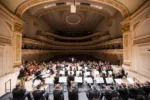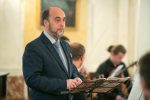Contrasts 27.POST-MODERNE/PAST-MODERNE
Lyudkevych Concert Hall
Lyudkevych Concert Hall
150
Subscriptions are valid

POST-MODERNE
«Melancholic Cantata in Honor of Lviv’s Mozart» was created by composer Bohdan Sehin and poet Ostap Slyvynsky especially for the opening of a sculptural composition installed in Lviv to celebrate the 230th anniversary of the birth of Franz Xaver Wolfgang Mozart.
The work is based on the intersection of two personally important to Franz Xaver topics, that determined his individuality throughout almost all his adult life.
The first topic is connected with the relationship between the artist and the city, which for him became a space of commitment and alienation, freedom and the struggle for recognition. Lviv was a city of aristocracy and bourgeoisie, carnivals and folk festivals, a city of many languages and cultures. It became the most important place for Franz Xaver not only as a space of freedom and self-realization but also as a space his love lived at.
The affair by Franz Xaver Mozart and Josefina Baroni-Cavalcabo is the second, but structurally the main plot of the work. The plot revolves around a paradox: being in love with a married woman had tied the composer to life in Lviv, apparent self-restraint (refusal of a great career, as Franz Xaver’s mother believed) gave him freedom of emotion.
The libretto to the composition, created by Ostap Slyvynsky, uses fragments of texts by Lviv’s Mozart from his «Concert Journey» — a travelling diary for Josephine, as well as the composer’s correspondence.
The work will feature a Latin text of the XVIII century «Hymn of Lviv» («In caelo stellis») by Bartolomei Zimorovich. Ostap Slyvynsky created his own texts for the work — dialogues.
The musical component of the «Melancholic Cantata» is based on a combination of acoustic sounds of the orchestra, choir and soloists in combination with electronic ones. In addition, composer Bohdan Sehin uses fragments from two works by Franz Xaver, named «Melancholic Polonaise II» and the song «Das liebende Mädchen» for soprano and piano. Two old Ukrainian religious songs are integrated into the general dramaturgy of the composition: «Look diligently, frail man» (Danylo Tuptalo’s songs) and «Sincere heart and love» (18th-century song by anonymous).
Artists:
- Iryna Stefanko, soprano (UA)
- Anna Ivaniushenko, harpsichord (UA)
- Olena Matselyukh, organ (UA)
- Myroslav Dragan, piano (UA)
- Dmytro Hubiak, bandura (UA)
- Marianna Vynar, melodeclamation (UA)
- Ostap Slyvynsky, narrator (UA)
- Section of wind instruments and percussion Lviv National Philharmonic Orchestra of Ukraine
- Lviv Vocal Ensemble “A cappella Leopolis” (artistic manager — Liudmyla Kapustina)
- Vincent Kozlovsky, conductor (PL)
Program:
- Bohdan Sehin (*1976, UA) & Ostap Slyvynsky (*1978, UA). Musical-literary composition “Melancholic Cantata in Honor of Lviv’s Mozart” for narrator, choir, orchestra, soloists and electronics (2021)
Partnership with the LvivMozArt Festival
PAST-MODERNE
Time of great civilizational changes can begin a new countdown. «Blood, ashes and world wars» (Yuriy Andrukhovych) in the second half of the 20th century conquered a different range of art — and the human community in its manifestations. The rest of the survivors are not delayed for fear of persecution and are anxiously looking for a way out into the future. Horror returns to its original shores.
However, the three selected works of the program are chronologically close to each other, which helps to shelter religiosity among the stormy messages of the time. The artist Andrzej Nikodemowicz (who was born in Lviv and spent most of his life there) with becoming a conductor at the Catholic Seminary during his 1980s got the opportunity to freely express his creativity. Before in 1973, during Easter celebrations the Komsomol patrol had caught his children, Nikodemowicz was deprived of the right to teach and expelled from the Composers’ Union, which led to the branding of his work and his departure for Poland.
For the first time, the work of the famous avant-garde artist Henryk Górecki was performed during the service of Pope John Paul II of the High Mass and was dedicated to the Head of the Church. The piece is addressed to the patroness of Poland, the Virgin Mary, and is recognized as one of the best works of Guretsky of that period.
In 1996, the Latvian Peteris Vasks changed the phrase «Give us peace» from the section of the Mass «Agnus Dei» into work for choir with organ. The son of a priest, since his childhood captivated by the whole church atmosphere, in music he discovers unknown beauty and genuine purity — this may be that ability and power to escape from modernism into a new life and culture of a new cycle.
Artists:
- Olena Matselyukh, organ (UA)
- Chamber Choir «Gloria» (UA)
- Volodymyr Syvokhip, conductor (UA)
Program:
- Andrzej Nikodemowicz (1925–2017, PL). «O jak bolejesz Matko», cantata for mixed choir a cappella. Selected parts (1985)
- Henryk Mikołaj Górecki (1933–2010, PL). «Totus Tuus» for mixed choir a cappella (1987)
- Peteris Vasks (*1946, LV). «Dona Nobis Pacem» for mixed choir and organ (1996)
With the support of ZAiKS and Pro Musica Viva Foundation














